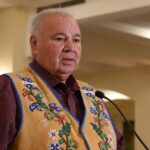A Saint John man charged in a double homicide is accused of killing his own sons, aged 10 and 17, court documents reveal.Roman Kamyshnyy is facing two counts of first-degree murder in the deaths of the boys last winter.A Court of King’s Bench justice had imposed an interim publication ban on the names of the victims until the case could be argued.CBC News challenged the ban, and Justice Kathryn Gregory has now clarified the media can report it’s a case of alleged domestic violence.Saint John police found the bodies of the boys inside a residence in Millidgeville in the city’s north end on Jan. 29, around 7 a.m., while responding to a 911 call.No information about how they died has been released.Roman Kamyshnyy, 46, will be tried by judge and jury from June 8 to June 26, 2026, on two counts of first-degree murder. (Roman Kamyshnyy/Facebook)At the scene, officers also found a man they described as having life-threatening injuries. He was taken into custody and transported to hospital.Police at the time said only that the man was known to the victims and have declined to disclose the nature of his injuries.Kamyshnyy, 46, is scheduled to face a jury trial in Saint John Court of King’s Bench from June 8 to June 26, 2026.Ban on names, photos remainsIn her decision, dated Nov. 13, Gregory said she was “satisfied that reference by the media, through publication and/or broadcast, to an alleged domestic violence context to the charge against the accused does not fall within the scope” of the ban.A ban on the names of the boys, as well as their photos, remains in place “for the duration of the jury trial proceedings and until a further order of this court,” Gregory wrote in a previous decision, dated Oct. 15.“I am satisfied, on a balance of probabilities, that such a ban prohibiting the publication and/or public disclosure of the identification of the two young, deceased victims, is in the interest of the proper administration of justice.”They may be referred to only as A.B. and C.D., Gregory said.Identity of ‘important’ witness protectedThe identity of “an important” Crown witness, identified only as Witness A, is also protected by a publication ban to ensure the individual’s ability to testify at trial, the judge ruled.This is in the interests of justice, “which requires a fair trial, both for the Crown and the accused,” Gregory said.Psychiatric report details releasedMeanwhile, she found an interim ban that covered the “entirety” of two psychiatric assessment reports regarding Kamyshnyy’s fitness to stand trial was “overly broad.”Any statements made directly by the accused during the assessments or referenced indirectly in the reports remain under a ban, but the first report, dated Feb. 21, shows Kamyshnyy was deemed “currently not fit,” following a five-day assessment at the Saint John Regional Hospital.Forensic psychiatrist Dr. Christopher Bryniak found Kamyshnyy was “functionally quite impaired.”“This case is not one of a psychiatric mental disorder, but rather symptoms stemming from the brain dysfunction secondary to physical trauma,” Bryniak wrote.Kamyshnyy underwent a five-day assessment at the Saint John Regional Hospital in February. (CBC)While Kamyshnyy was alert and tracked people with his eyes at times, he had “not yet regained any level of interactive consciousness/ability to communicate in any significantly meaningful way,” Bryniak said.“I will note that staff on the floor have even attempted to communicate via a Ukrainian translator with no success.”Kamyshnyy did at times “briefly flutter his eyelids when asked a yes/no question,” but Bryniak believed his ability to instruct and communicate with a defence lawyer was “profoundly impaired.”In addition, Kamyshnyy showed no consistency in following basic motor commands and failed to demonstrate any independent ability to transfer himself to a sitting or standing position.“It is extremely difficult to predict at this point in time when — or even if — Mr. Kamyshnyy may recover to the extent that he might regain fitness,” Bryniak said.“The best chance of regaining fitness, in my opinion, is to follow along with the usual rehabilitative clinical pathways (this decision is best left to his treatment team),” he advised.‘Substantially improved in a relatively short period’Kamyshnyy was ordered to undergo a further 30-day assessment, which was conducted at the Restigouche Hospital Centre in Campbellton.On April 3, Bryniak determined Kamyshnyy was fit to stand trial “and should remain so into the foreseeable future.”“While there is a very mild language barrier present, I am not seeing any evidence at this time of grossly impaired cognitive function/ability or severe psychiatric syndrome,” he wrote.The “vast majority of people who sustain traumatic brain injuries recover “to a large extent within the first 12 months,” Bryniak said.Kamyshnyy, however, had “substantially improved in a relatively short period of time.” Mr. Kamyshnyy is well able to communicate with his counsel (if he so chooses to) and assist in his defence.- His ability to learn new information seemed to be “intact” and his thought process, “linear and logical,” according to Bryniak.There was “no substantial variation/fluctuation to his mental state,” he exhibited no “unusual psychomotor activity or posturing,” and his speech rate, volume and latency of response were all considered normal.According to staff, he was sleeping and eating well, and tended to “keep to himself or watch TV,” Bryniak said.“Mr. Kamyshnyy is well able to communicate with his counsel (if he so chooses to) and assist in his defence.”Crown requested banCrown prosecutors Elaina Campbell and Orlando Lineros had requested the ban on the victims’ names.Details about the evidence and arguments presented in the absence of the jury cannot be reported, but in her decision the judge dismissed any notion that CBC challenged the ban for “inappropriate reasons.””There can be no doubt that the allegations and backdrop here are horrendous and unimaginable,” Gregory wrote. “The killing of any person is traumatic, tragic and causes untold harm and suffering.“The killing of children and youth, however, adds additional layers of trauma, shock and horror due to their age-related inherent vulnerability.“Justice system participants are human and despite our commitment to ‘dry-eyed justice’ … emotions can run higher in these extremely difficult cases.”She understood CBC’s motivation was to seek clarification of the law regarding publication bans relating to deceased young victims, she said.“I will note that many, if not all, Supreme Court of Canada decisions that have advanced the law and assisted us all in our understanding of how conflicting legal principles impact on court openness, have been the result of challenges brought by the media, with CBC often cited as the entity doing so.”
Saint John man accused of killing his sons, court documents reveal











